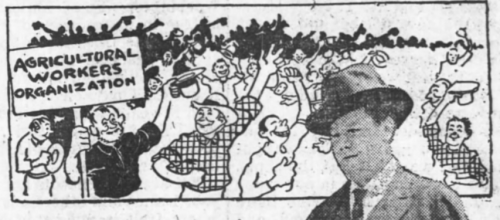Hellraisers Journal: "This is the Story of the Success of the Agricultural Workers' Organization."
robbed from the agricultural workers.
Perhaps never in the history of the world was there a war more unequal,
or a success more unexpected.
-ISR on the AWO, December 1915
~~~~~~~~~~~~~~~~~~~~~~~~~~~~~~~~~~~~~~~~~~~~~~~~~~~~~~~~~~~~~~~~~~~~~~~~~~~~
Wednesday December 22, 1915
From the International Socialist Review: No Budget, No Problem for the Agricultural Workers' Organization
From the Review of December 1915:
A NEW CHAPTER IN INDUSTRIAL REVOLUTION
By J. A. MacdonaldTHIS is the story of the success of the Agricultural Workers' organization. This story is not finished, it cannot be till the doomed industrial system of today has also been damned and over thrown. It is the story of the moving of the propaganda of revolutionary industrial unionism from the open forum and the street corner, to the primary theater of the industrial revolution—the job.
The wise men of the labor movement—generally too wise to work—the philosophers of the easy chair and the big salary, said the migratory worker could not be organized. They said the work was too casual. A union for them would have to be too migratory. It would have to have its office in a box car.
The I. W. W. said that the labor organization which could become a permanent factor in American industrialism must start at the bottom and work up, instead of starting at the top and working down. The wise men said the members of the Industrial Workers of the World were not philosophers, they were working men and consequently did not know anything of the labor movement. The idea of a workingman, and especially a migratory worker, contradicting the labor leaders was preposterous—to the labor leaders. It was a glaring infringement on the right of leaders to do the thinking of the working class. But was there ever a philosophy which could overthrow a fact. The A. W. O. is the proof that the "Hoboes" were correct and the labor leaders wrong.
On the fifteenth of last April a number of members of the Industrial Workers of the World got together at Kansas City, Mo. The attendance would have been greater only that a large number of "The Hoboes" were in jail at Sioux City. Thirteen of these workers, dreamers of a system of society not founded on loot or murder, got a charter for Local 400 of the I. W. W. under the name of the A. W. O. Again preposterous! These thirteen banded together to organize every worker in the agricultural industry of the world. The unmitigated nerve of these thirteen throwing the gauntlet and declaring war to the death against the financial interests of this primary industry, entrenched behind laws that have been the product of centuries of outrage!
With no treasury they declared war against the millions of dollars robbed from the agricultural workers. They declared war against their own money, which had been stolen from them. Perhaps never in the history of the world was there a war more unequal, or a success to the surface student of the labor movement, more unexpected.
The Kansas City Star, endeavoring to help the agricultural capitalists, and the various parasites who prey indirectly on that basic industry, sounded a warning cry that resounded throughout the nation. It helped the farmers by scaring them to death. Yellow exaggeration, it said the I. W. W. was going to concentrate in the state of Kansas with 30,000 members. They were going to destroy all the separators, burn all the harvest fields and put dynamite into all the shocks. The membership of the A. W. O. laughed and the farmers trembled.
The members of the A. W. O. did not intend to destroy the separators, or burn the fields; they needed both. They would not put dynamite into the shocks as they intended to be at the machine when the bundles went into it, and they were not anxious to go to heaven, not even with farmers as company.
Dynamite could not have done as effective work as did the capitalist papers, unconsciously and unintentionally.
Advertised by the Capitalist press, THE INTERNATIONAL SOCIALIST REVIEW and all the other radical papers and magazines, men with actual first hand knowledge of the conditions in the harvest field applied to Secretary Nef of the Agricultural Workers' Organization for credentials as delegates. They went on the job and gained the friendship of the unorganized, instead of using a campaign of abuse. They showed them the logically inevitable, that the millions of dollars worth of standing grain in the state of Kansas was not worth one cent, except through the application of their labor power. They said—rank treason—that the proper time to strike was without notice when the grain was ripe.

Like a prairie fire, or the snow ball which starts at the top of the mountain and gathering power in geometric ratio becomes an avalanche, this great working class movement spread. The material interest—the selfishness of the dispossessed, dictated organization. Strikes were pulled off, the farmers already frightened automatically, raised wages. The farmers through these began paying more wages and the working class began joining the union of their class, thus building a treasury for further victories.
The theater of war was moved in box cars from the harvest fields of Kansas to the harvest fields of Dakota. The working class began to see the harvest fields in the light of the industrial democracy to be. 174 delegates, inspired with the enthusiasm of past victories, became more insistent in their demands that the working class, through organization, help the boss to set the wages and hours. Repeatedly one member of the A. W. O. has gone on the job and within one week all the workers would be wearing the button on the job.
With the newly-found nerve that is the result of organization, they would, as one man, tell the boss that ten hours was enough and too much, that three dollars or three and a half was too small, as they would need pork chops next winter. They wanted three good meals and were willing to tell the cook what to order. They wanted a lunch in the morning and a lunch in the afternoon. If the coffee was not good they told the boss a bunch of their class brothers in the Agricultural Industry in Brazil were raising good coffee, to be sure and get some.
Inspired by their example, workers on other machines would join the organization that brought the kind of results they could eat. The average "harvest stiff," not being a fool, when he sees that organization means better wages, inevitably joins. Somewhere in the neighborhood of 3,000 have in this way lined up in the A. W. O. in the past three months. Exact figures are at the present impossible to obtain as members are coming in so fast that the overestimate of today is the underestimate of tomorrow.
Coming back with more money than usual and good clothing, did the warrior off the tiring line want to lay off for the winter? One whom the writer questioned, said: "I am going to take a long vacation after we have overthrown the capitalist system." A strong wage-raising, hour-lowering organization in the lumber industry is the immediate aim of the A. W. O., with job control, a closed shop and an open union for the harvest fields of the continent next fall in the background.
Back from the harvest, the membership had a blow-out that will make the 14th, 15th and 16th of November red-letter days in the story of the revolutionary movement. At Minneapolis on the fourteenth a gigantic mass meeting was held at Pence Auditorium with W. D. Haywood as principal speaker. Here, "The Hoboes," with a mission, drafted a bunch of resolutions showing their movement to be international in scope and world conquering in aim. They sent a resolution to the I. W. W. of Australia endorsing the action of Secretary Barker of the I. W. W. administration there. They next, enthusiastically, with hats in the air, and with some eyes tear-filled, endorsed the nobility of the true revolutionists of Europe, who chose persecution and death rather than murder their class brothers.
On the fifteenth and sixteenth the great mass meeting of the A. W. O. democracy was held. It was decided to immediately move on the big timber and the orange harvest fields of California. Delegates were sent out to work on the various jobs thus getting the boss to pay organization expenses. A strong organization committee, three of them lumberjacks, was elected and the A. W. O., like Tom Brown's body, goes marching on.
On the evening of the fifteenth a big smoker was held. In it was prefigured the drama of the future. The dramatists were members of the I. W. W. The actors were members of the I. W. W., and the audience were members of the I. W. W. Through out, enthusiasm ran high and the movement started without treasury and almost with out membership, is the most promising factor in the industry of today. Few there are who doubt it will be a great and vital part of the industrial democracy of the future civilization, without master or slave. Its lesson is that the working class will organize. Its story the story of when the I. W. W. took jobitis.
[Photographs, emphasis and paragraph breaks added.]

SOURCE
The International Socialist Review, Volume 16
-ed by Algie Martin Simons, Charles H. Kerr
Charles H. Kerr & Company, July 1915-June 1916
https://books.google.com/books?id=9VJIAAAAYAAJ
ISR December 1915
https://books.google.com/books/reader?id=9VJIAAAAYAAJ&printsec=frontcove...
A NEW CHAPTER IN INDUSTRIAL REVOLUTION By J. A. Macdonald"
https://books.google.com/books/reader?id=9VJIAAAAYAAJ&printsec=frontcove...
IMAGES
Agricultural Workers Organization, Big Bill Haywood, Day Book, Sept 24, 1915
http://www.newspapers.com/image/77858368
IWW, emblem, libcom, Sioux City FSF of 1915
http://libcom.org/history/sioux-city-free-speech-fight
History of 400 A. W. O. by E. Workman, 1939, Cover
https://archive.org/stream/HistoryOf400A.w.o.TheOneBigUnionIdeaInAction/...
See also:
"The Sioux City free speech fight, 1915"
-by Bill Douglas
http://libcom.org/history/sioux-city-free-speech-fight
The Survey of Oct 30, 1915
"How One Town Learned a Lesson in Free Speech" by Wallace M. Short
https://books.google.com/books/reader?id=bLU5AQAAMAAJ&printsec=frontcove...
"Threshing Wheat" by Nils H. Hanson
https://books.google.com/books/reader?id=9VJIAAAAYAAJ&printsec=frontcove...
History of "400" A. W. O.
The One Big Union Idea in Action
https://libcom.org/library/history-400-awo-one-big-union-idea-action
History of the Labor Movement in the United States, Vol 4
The Industrial Workers of the World, 1905-1917
-by Philip Sheldon Foner
International Publishers, 1965
https://books.google.com/books?id=e-KlAAAAMAAJ
Always on Strike: Frank Little and the Western Wobblies
-by Arnold Stead
Haymarket Books, Dec 15, 2014
https://books.google.com/books?id=zTjvBwAAQBAJ
``````````````````````````````````````````````````````````````````````````````````````````````````
The Tramp, Lyrics by Joe Hill
http://www.folkarchive.de/thetramp.html
Performed by Cisco Houston
https://www.youtube.com/watch?v=f--dCVyLpbk
[video:https://www.youtube.com/watch?v=f--dCVyLpbk width:560 height:315]
If you all will shut your trap,
I will tell you 'bout a chap,
That was broke and up against it, too, for fair
He was not the kind that shirk,
He was looking hard for work,
But he heard the same old story everywhere:
CHORUS:
Tramp, tramp, tramp, keep on a-tramping,
Nothing doing here for you;
If I catch you 'round again,
You will wear the ball and chain,
Keep on tramping, that's the best thing you can do.
``````````````````````````````````````````````````````````````````````````````````````````````````


